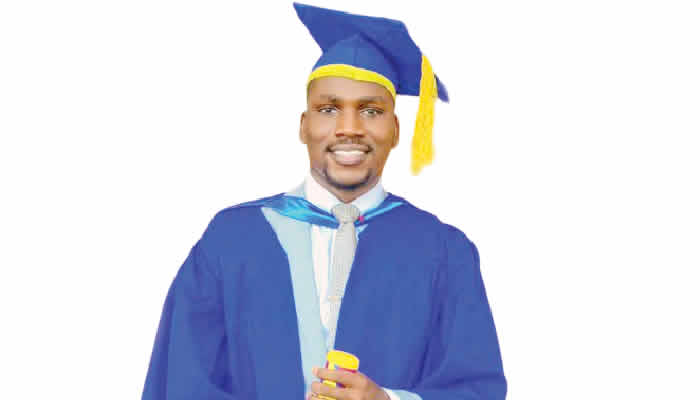
Adeogun Joshua, a 23-year-old first-class graduate of the Federal University of Technology, Akure, Ondo State, speaks with TEMITOPE ADETUNJI about his academic journey and shares the unexpected twist that made him spent seven years for a five-year course
Which school did you graduate from?
My name is Adeogun Joshua. I am 23 years old. I am from Ile Alagbede in Atiba Local Government Area of Oyo town, Oyo State. I was admitted into the Federal University of Technology, Akure in 2016 and graduated in November 2023.
What are your thoughts and feelings regarding graduating with a first-class honors degree?
The feeling was overwhelming because, with that kind of result, everyone is watching you to see what comes next. So it’s more like it’s you against the world because you can’t afford to fail. You started it well, so you have to continue to do well. So I think that’s how I see it. Graduating with first-class honors was a huge success for me. I am forever grateful to God Almighty for making it possible.
What was your course of study?
I studied civil and environmental engineering.
When did you first realise the possibility of achieving outstanding academic results?
My first result in 100 level was a surprising First Class honors of 4.62 GPA and this gave me the first boost of motivation throughout my days in school.
It made me more focused because I wasn’t expecting a high GPA in my first result. Although I dropped out in the next semester, I still had the thought on my mind that If I was able to make a high GPA on my first attempt, then with more determination, I should be able to finish Strong as well. I saw that students who achieved the first class honors didn’t have two heads and since I had it, I wasn’t going to let go of it easily by relaxing and allowing my performance to drop.
Can you share your experience during the first semester?
I had my primary and secondary school education at a private school where teachers always ensured that every topic thought was well understood before moving on to the next. So attending a public school for a higher level of education was a shift for me. I attribute that to the level of freedom that accompanies schooling in a public school. Here, your future is in your hands. I was made to realise and understand how everyday decisions could easily either aid or tarnish your not-so-distant future. That was the first time I truly ever felt like that and this made the liberty and freedom overwhelming to me. Nobody was monitoring you to deliver on assignments or tests, because it’s all on you. So I would say that I went a little overboard with that initial freedom, and I think, as a result, I couldn’t even finish my first ever mathematics exam at 100 level. I was overwhelmed and I wasn’t well-prepared for it.
Why were you unable to finish that mathematics exam?
This happened during my first-semester examination in my first year. It was a computer-based exam with a time limit. You definitely can’t ask for more time. It’s you and your computer, one on one. So if you don’t know it, you don’t know it. I’d say I didn’t finish because I was not well-prepared and didn’t manage my time properly. Not knowing a question was challenging for me back then because you’re either right or wrong to the computer. This made me squander most of my limited time fretting over intricate questions rather than moving on to much easier ones. I still wanted to try and try and try until my time ran out. And I didn’t even finish. Out of, I think, four sections, I only completed two.
What was your result like in the first semester of your first year?
Surprisingly, I had a 4.62 GPA. I knew it could have only been the work of God.
So what inspired you to study that course?
I was motivated by my uncle. He’s a well-established civil engineer with his own construction company. As a child, seeing him doing well as a civil engineer made me admire him. He was always so hardworking. I knew his line of work was what I wanted to get involved in. His work pattern just seemed fascinating to me.
What were the things you enjoyed about studying the course?
Civil engineering is a broad course. There is the Highway and Transportation Section, the Structural Section, the Hydrology and Waste Water Treatment Section, the Geotechnical Section, the Environmental Section, and the Strength of Materials Section as well. From the wide range of choices, the course encourages you to find the section that piques your interest.
It’s just quite broad. So if you don’t like some sections of the course, you will always be able to fall in love with other aspects of the course. You’re not forced into one particular branch of it. That’s what interests me.
What was your CGPA when you graduated?
I graduated with a 4.53 CGPA. It was a testimony.
Why was it a testimony?
Because with all the strikes I had to go through, it was great to finish with that grade. It was supposed to be a five-year course. However, I spent seven years due to the strikes without having a carryover in any course or failing. As a result of the strikes, there was always a long break between semesters, in the middle of the session, or towards the exams. And during that break, you don’t know how long it’s going to last. So you have to find something to do because you can’t just stay at home reading for weeks.
You also have to gain experience. This was the period I always used to get most of my theoretical and practical civil engineering experience.
After going through a long unscheduled break, and then coming back again to school to come and write an exam was tough. It took the grace of God to keep going. I think my colleagues would also testify that it was not easy at all. It’s very traumatising to leave school, come back after maybe three months, and then sit to write an exam. Despite all these, I did my best and am glad it was worth fighting for.
Which course presented the greatest challenge during your academic journey?
That’s the geotechnical engineering course. It was a whole different experience because there was a lecturer who pushed us to the limit by bringing new standards. Sometimes you can read past questions and would be fine, but this one was not like that. It proved tough for most of us to learn. You have to go and do your research, find innovations, and go the extra mile to succeed. You can’t just read past questions, you also have to understand them. So that was a very challenging course.
What was your study method like?
Luckily, I surrounded myself with friends that read almost every night. Every single night, we’d gather together as a group and burn the midnight oil. Group reading contributed to my academic success. Studying with like-minded friends went a long way for me. Sometimes you can just be tired, but when you have someone beside you who’s still pushing and reading, with no signs of relenting, that will encourage you to keep going.
How did your parents react when you told them about your results?
I tried to prank them at first to see their reaction. And it was funny how they acted very supportive but I could feel their heartbreak. Because they know how hard I did try and they were like, you know, “what would be would be”.
So I later opened up to them that that wasn’t my final CGPA, opening up to them that I made a first class. I could feel the joy in their voice, especially my dad. He was so happy as he had sacrificed a lot for me. The day they announced my name as a first-class graduate during my graduation day, my mum just burst into tears. And I’m glad I gave them that joy. I think every parent deserves to be made proud.
Are you the only first-class graduate in your family? Do you have siblings?
My sister is a Medical Doctor. I don’t think they gave a first class for medicine. I am the second born and middle child. I have two siblings, and my younger sister is still in school studying dentistry.
To what extent did your parents influence your education?
To a very great extent. From primary school, as a young child, I didn’t even understand the whole concept of homework. I was always playing and watching TV after returning from school. When my dad noticed, he called my headmaster back then and told the man to discipline me and make me understand the importance of homework and diligence.
From then on, my dad helped me study better. He also taught me how to attend to my homework throughout my primary school years. So I think that helped me in the long run when I got into secondary school and university.
As a child, what has always been your career passion?
As a child, I was fascinated by spaceships, airplanes, and helicopters. Anything with an airborne ability baffled me. So, I wanted to be a pilot or an astronaut.
Did you get involved in any social activities while you were in school?
I was looking forward to participating in playing football and basketball at the university. However, due to the time constraints I had in school, I often hardly had any time to spare to enjoy sports. And in church, although I was not a worker, I always tried as much as possible to make myself available. I would try to make time to assist in any programme or outreach that is being organised.
Do you believe that participating in social activities as a student could potentially detract from academic performance?
I don’t think so. This is because I had friends who studied as well as I did and were still active in football and church programmes. One would think that they don’t read. However, when the time came for them to show themselves academically, they were never found wanting. So I slacked a bit on that part. I could have been more social and managed my time better.
Do you keep a large or small circle of friends?
As a guy, I have a small circle of close friends. But in general, I see everyone as my friend.
What are the things that helped you achieve this feat?
God and prayer, that has to be first. Then, motivation, of course as well as keeping calm. Because, of course, in a government school, any lecturer you meet can be a sadist. They can have different attitudes towards students. They don’t care if you pass or fail. You are really on your own. So, I think self-motivation is the main thing.
How would you have reacted if you had not attained first-class honors?
I would have been, of course, heartbroken because it was a whole lot of work and effort that I put into it. So, that’s why I would have felt heartbroken if that was the case. But, in the end, of course, there are a lot of people who make it far in life without having that first-class degree.
What were the things you did differently that made you stand out academically?
Yes, there were. For example, if I am given an assignment or project, I don’t let it get past one day or two. Depending on how free I am, I will find a way to make time to do that project or assignment that day. Then I would reach out to my serious-minded colleagues, who share the same mindset as I do. So, we would rub minds together on it because you can’t be an island. You have to also mix with people.
What would you describe as your most challenging moment on campus?
I think that was during my 100 level. At that period, there were a lot of courses and little free time. And then, I was a fresher in a no man’s land. Not knowing anybody was quite difficult to overcome because then, I neither knew who to trust nor how things were done on the campus.
During the first semester, of the first year, students would attend lectures and leave the lecture hall more confused than when they arrived. This was due to the unconducive environment we found ourselves in and the number of students expected to gather in a lecture hall and listen to a lecturer aided by nothing but his or her vocal cords. It wasn’t easy.
What guidance would you offer to students aspiring to replicate your academic achievement?
My advice is that they should always put God first. Pray to Him for guidance, because all fingers cannot be equal.
Then, never leave for tomorrow what you can do today. If you can do it now, I think you should do it. It’s better not to procrastinate.
While you were in school, were you involved in a relationship?
I got into a few relationships, and the good part was most of them understood what I was trying to achieve and I think that’s a good attribute of a good partner. When a partner is supportive and can support you, you will have no problem. Someone who claims to love you will never want you to fail or want to see you fail.













